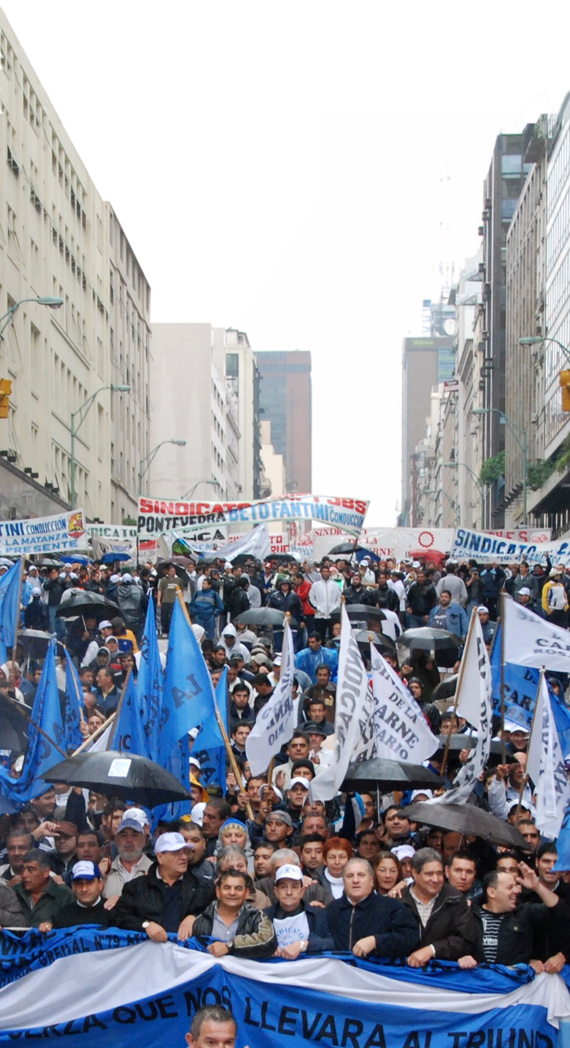|
Fantini
is secretary general of the
Federation of
Workers of the Meat and Meat Byproducts
Industry. SIREL spoke with him about the
situation in the meatpacking sector and its implications for the industry’s
workers.
-What is the
situation in the meatpacking sector?
-As workers we
are very concerned because there are about 8,000 of us who have had their
workdays cut, and are being paid a monthly minimum equivalent to some 140 work
hours.
That’s how
things are right now, and we’re hoping the national government will issue a
resolution to address the work shortage, granting some form of subsidy for meat
workers.
-Your
Federation is mobilizing…
-Just a week
ago we organized a mass rally. On April 24, 5,000 workers from the meatpacking
industry took to the streets and rallied in front of the National Ministry of
Labor.
It’s a
deplorable situation, because
Argentina
used to have the highest per capita meat consumption in the world, as high as 71
or 73 kilograms a year, and now we’re down to just 60 kilograms.
-Has the number
of heads of cattle being slaughtered gone down?
-Yes, more than
30 percent. Today the country is slaughtering 35,000 heads of cattle a day, and
it used to slaughter 55,000. Some operators in the meatpacking sector are not
suffering losses yet because they compensate for the fall in production with
higher prices; but workers are really feeling that 30 percent drop.
-What is the
Federation demanding?
-Our primary
demand is work, and while no solution is found for that, we need to have some
form of subsidy for workers. We explained to the Ministry that the 140-hour
equivalent pay is not enough, that we need an amount closer to the income we
received when we were working normally, that is, 2,400 to 2,500 Argentine pesos
(approximately 618 to 644 US dollars).
After the rally
we reached an agreement with the Ministry of Labor, which promised to come up
with a solution for this, through a decree or some other instrument.
But so far we’ve had no response.
The workers have been earning 30
percent less for three months now, and if cattle slaughtering doesn’t go up,
things will only get worse.
-Where do you
think the solution is?
-We need to
develop more long-term policies instead of just applying a band-aid fix every
six months. We need a policy that contemplates the interests of all the
stakeholders involved: cattle ranchers, meatpacking operators, and workers;
a State policy that is
implemented no matter what government is in power.
We love to
boast that we have the best meat in the world, and our country is in fact known
either for Maradona
or for its meat. So how did we get to this point? It’s unbelievable.
-Problems have
been mounting in the sector for some time now…
-Yes,
food-and-mouth disease, droughts, problems affecting the animals, mad cow
disease, rural lockouts and export suspensions. And through it all the workers
always came out losing. So we need to be covered by clear, long-term policies.
-Do you recall
a situation like this in the past?
-No. I’ve been
secretary of the Federation for the past three years and, unfortunately, I’ve
had to deal with all sorts of problems. First, the organization was in dire
straits, we weren’t participating in the
General Labor Confederation
(CGT),
or in the Confederation
of Labor Associations of the Food Industry
(CASIA)
or in the
IUF.
And we’ve also had to deal with all the problems that have been affecting the
sector.
What needs to
be acknowledged is that meat industry workers are skilled workers. You need
special skills to work in a meatpacking plant. And we can’t just throw away the
opportunity that a rich, cattle country like ours has; that would be ludicrous
and senseless.
 |